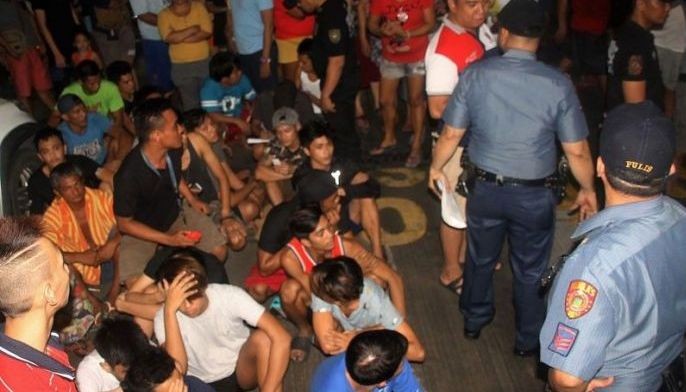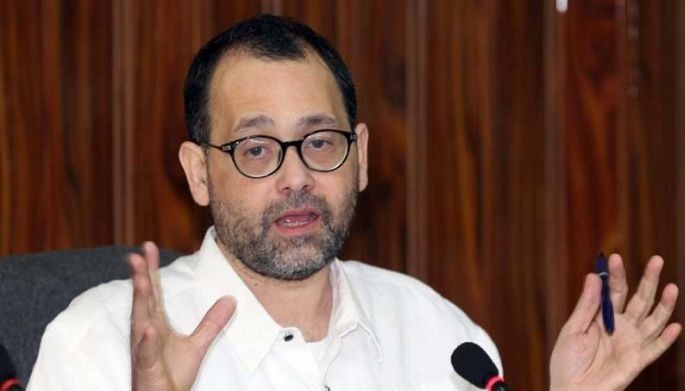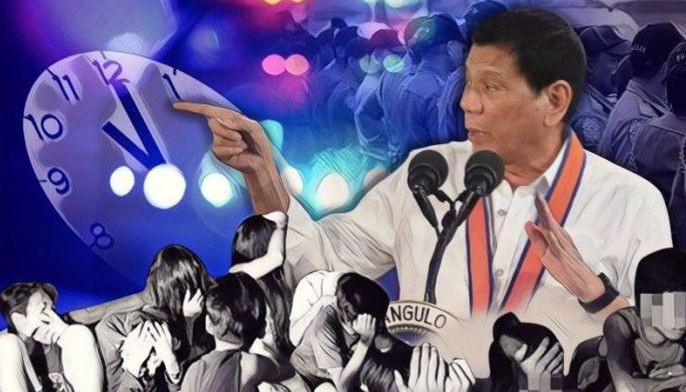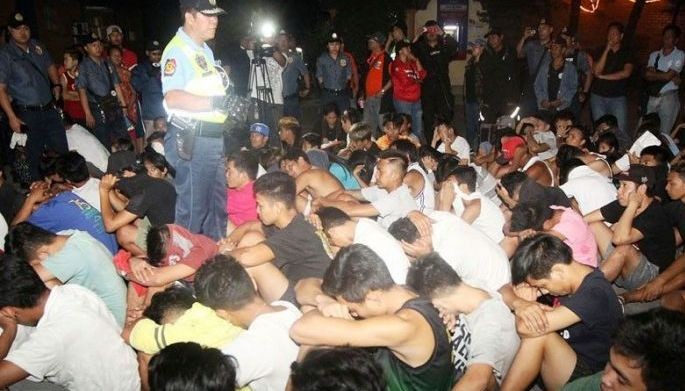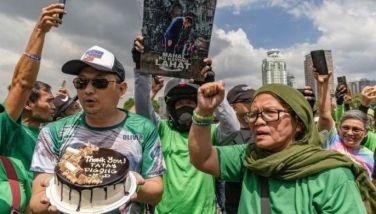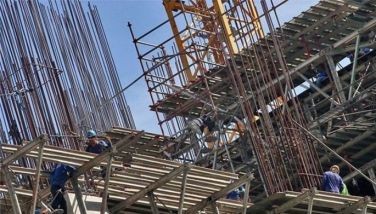20 things you need to know about the 'anti-tambay' drive
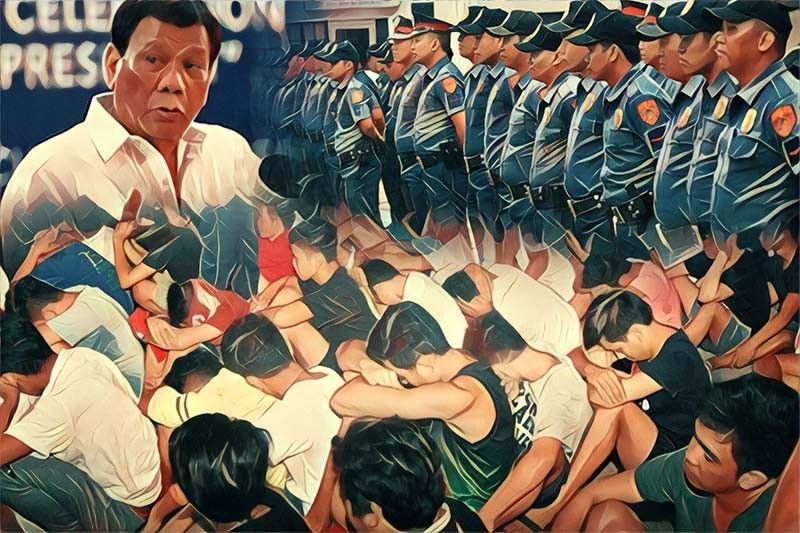
MANILA, Philippines — President Rodrigo Duterte stirred yet another controversy when he ordered a crackdown against loiterers or "tambays," whom he described as "potential trouble for the public."
Officials claim the campaign is meant to promote peace and order in the streets and to implement existing local ordinances. Critics fear that the campaign could lead to arbitrary arrests and illegal detention similar to those during the martial law era.
Concerns arose about the way the campaign was mounted following the death of 22-year-old Genesis "Tisoy" Argoncillo, who was arrested and jailed for allegedly causing alarm and scandal.
Human rights advocates and experts have reminded the public to be vigilant, noting that awareness of the law and one's rights is a deterrent to abuses.
Here are 20 things you should know about the campaign against loitering.
1. Duterte instructed policemen to accost, not arrest idlers
In a speech delivered in Iloilo last June 13, Duterte directed the police to impose stricter measures against loiterers to make the streets safer, especially at night.
"My directive is 'pag mag-istambay-istambay sabihin ninyo, 'Umuwi kayo. 'Pag 'di kayo umuwi, ihatid ko kayo don sa opisina ni ano don, Pasig.' Ako na ang bahala, ilagay mo lang diyan. Talian mo sa kamay pati bin-ihulog mo diyan sa ano. Do not — you be strict. Part of confronting people just idling around. They are potential trouble for the public."
Duterte, however, clarified a day later that he wants the police to accost and not arrest tambays.
"Of course I can accost you. Sabihin ko, 'what are you doing here?' If you are a minor under the power of parens patriae, you are the father of the nation, you can always give an advice for people kagaya ng minors," he said during an information and communication technology summit in Davao City.
"I never said arrested. But if you are drinking diyan sa alley, 'yung mga squatter's area. If you are there, making a sala out of the road there, t*** i** huhulihin talaga kita," he added.
2. The police chief did not want to use the word 'tambay'
As critics expressed concerns on the president's directive, Philippine National Police chief Oscar Albayalde ordered police units to stop using the word "tambay" when reporting about the arrest of people who violate local ordinances. He instructed them to use "persons apprehended for violating city ordinances" instead.
Duterte, however, reversed this, saying loiterers should be called "tambays," a term that he has known since his younger days.
3. Over 11,000 people have been rounded up in Metro Manila since the president issued the directive
Albayalde said that of the 11,000 people brought to police stations since June 13, less than a hundred remain in police custody while the rest have been turned over to barangays. Others have paid fines for their violations and have been freed.
4. Loitering is no longer a crime under the Revised Penal Code
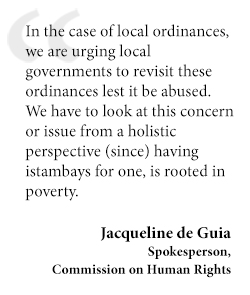 Loitering was decriminalized in 2012 when former President Benigno Aquino III signed Republic Act 10158. The law, which amended Article 202 of the Revised Penal Code, decriminalized vagrancy except for prostitutes.
Loitering was decriminalized in 2012 when former President Benigno Aquino III signed Republic Act 10158. The law, which amended Article 202 of the Revised Penal Code, decriminalized vagrancy except for prostitutes.
Presidential spokesman Harry Roque said in a recent press briefing that loiterers would be accosted for violating existing laws, not because of vagrancy.
Commission on Human Rights spokesperson Jacqueline de Guia said the arrests are illegal unless there is a local ordinance about anti-loitering.
"In the case of local ordinances, we are urging local governments to revisit these ordinances lest it be abused. We have to look at this concern or issue from a holistic perspective (since) having istambays for one, is rooted in poverty," De Guia told Philstar.com in an interview.
5. Duterte wants minors to be covered by the anti-loitering campaign
The president said police should accost loitering minors to "protect" them from illegal drugs and other threats. He clarified that loiterers below 18 years old would not be arrested but would be brought to the Social Welfare department.
"So 18. We do not have specifics. Eighteen, below 18, you arrest the teenagers there around loitering because we have to protect our children. Nagkalat na ang droga, nagkalat na ang lahat (Illegal drugs are rampant)," he said in Cagayan de Oro City this week.
6. The person has the right to know the identity of the police in cases of warrantless arrests
Enrique dela Cruz, senior partner of law firm DivinaLaw, said it is important that a person knows the identity of the arresting officer and his unit to hold him accountable.
“Obviously (in cases of illegal arrests), there are no warrants. In the absence of such, you must know who they are so you can inform your loved ones,” Dela Cruz said in a phone interview.
People should also file a complaint if there were human rights violations committed during the arrest, he added.
7. You have the right to refuse to sign any documents in the absence of a legal counsel
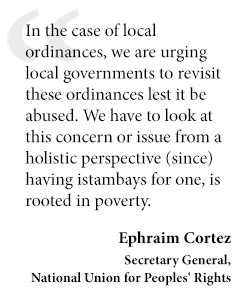 Lawyer Ephraim Cortez, secretary general of the National Union for Peoples' Rights, said a person is not obliged to confess to any crime to the police. He said a person should only sign a waiver or documents with the help of a lawyer.
Lawyer Ephraim Cortez, secretary general of the National Union for Peoples' Rights, said a person is not obliged to confess to any crime to the police. He said a person should only sign a waiver or documents with the help of a lawyer.
Dela Cruz warned against the signing any documents, especially "Waiver of Article 125," which allows authorities to detain a person even without a charge.
"Article 125 is the provision in the Revised Penal Code punishing arbitrary detention. If you were imprisoned by the police without any basis, you can charge the police (for illegal detention)," he said.
8. Communication from the outside is important
Cortez also stressed the importance of communicating with one's family or friends while inside the precinct, noting that it is part of the rights enshrined in the Constitution.
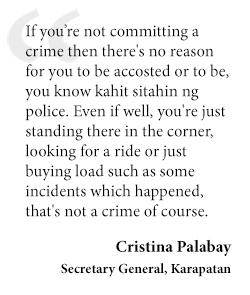 "If you have been brought to jail, the first thing you should say is you want to talk to your lawyer and your family. These are the rights under the Bill of Rights. A person arrested or detained should talk to a lawyer or a family member immediately. Communication outside is an important right," he said.
"If you have been brought to jail, the first thing you should say is you want to talk to your lawyer and your family. These are the rights under the Bill of Rights. A person arrested or detained should talk to a lawyer or a family member immediately. Communication outside is an important right," he said.
Cristina Palabay, secretary general of rights group Karapatan, said a person in question should immediately inform their loved ones about what is happening.
"Before even going to the station or anything, he or she must assert her right to counsel or they can inform their relatives, fellow workmates or classmates, anyone that can be informed that they are being brought to a certain place," Palabay said.
She said an arrested person also has the right to have access to human rights organizations.
9. You may choose not to answer any questions from authorities if unaccompanied by a lawyer
Palabay said an arrested person cannot be forced to give any information in the absence of a legal counsel.
"(The insistence of a lawyer's presence) should be asserted to the police officers. They won't do anything to you unless you are properly advised by your lawyers," Palabay said.
Remaining silent is part of the essential rights of a person being arrested, Cortez said. This means that a person is not obliged to confess to crimes.
"There are times where people will be forced to confess their crimes… Confessing to crimes especially if it is against your will is against the law and it can never be used in court," Cortez said.
10. Knowing your local ordinances is important
If you are collared for loitering, you should ask the police for a copy of the ordinance the city is implementing from the police, Dela Cruz said.
Lawyer Jesus Falcis said the police should tell the arrested person what ordinance was violated.
“Walang maaapi kung walang magpapa-api. Don’t let the police abuse their powers,” he added.
11. You are still free to roam around as long as you did not violate the law
Despite Duterte's directive, human rights lawyers said one is still allowed to go outside and perform duties as long as that person is not committing a crime.
"If you’re not committing a crime then there's no reason for you to be accosted or to be, you know kahit sitahin ng police. Even if well, you're just standing there in the corner, looking for a ride or just buying load such as some incidents which happened, that's not a crime of course," Palabay said.
Earlier, two call center agents mistaken for loiterers were arrested in Makati City. The cops have since then been relieved from their posts for illegal detention.
12. If arrested, stay calm
If a policeman arrests you in the middle of the night, calmly ask him why you are being arrested.
Falcis said an arrested person should remain calm and should cooperate with authorities if he did not violate any law.
"Just be polite to policemen and say you know your rights. Being a tambay is not a crime," he said.
Dela Cruz said a person under arrest should not argue with the police but they still have the right to ask why they are being detained.
"Since it is no longer a crime to loiter, the only thing that can be charged against that person is the violation of a city or municipal ordinance. He must be given a copy to know what laws were violated," he said.
13. There are laws that protect you against illegal detention
Republic Act 7438 or the Act Defining Certain Rights of a Person Arrested, Detained or Under Investigation enumerates the rights of the person arrested or detained under custodial investigation.
The Miranda Rights enshrined in Article 3, Section 12 (1) of the Constitution also states that any person under investigation for the commission of an offense shall have the right to be informed of the right to remain silent and to have competent and independent counsel preferably of their own choice.
"If the person cannot afford the services of counsel, he must be provided with one. These rights cannot be waived except in writing and in the presence of counsel,” the provision read.
14. The length of detention depends on the gravity of the offense
CHR's De Guia said a person arrested without a warrant must be presented to an inquest fiscal and the inquest proceedings must be terminated within the following periods:
- 12 hours - light offenses or cases with a penalty of not more than one-month imprisonment (e.g. vagrancy and vandalism)
- 18 hours - less grave offenses or cases with a penalty of not less than six years (e.g. illegal assembly, direct assault)
- 36 hours - grave offenses or cases with a penalty of more than six years (e.g. sedition, rebellion)
However, if authorities have no reason to detain you, you must be released immediately.
15. You are free to choose your own lawyer
Cortez said one should immediately invoke his right to have a lawyer once arrested. He said the arrested person might be represented by his chosen lawyer or a counsel provided by the state if he could not afford to hire one. Cortez and Palabay also reminded the public that they are not obliged to accept the lawyer provided by the police.
"The government should provide a lawyer for you if you want one, (but) you can also assert to have your own choice if you think the lawyer is competent and independent as well,” Palabay said.
16. Violation of ordinances do not lead to immediate imprisonment
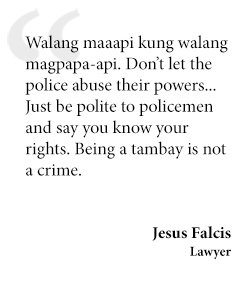 Dela Cruz said that even if there is a city ordinance prohibiting loitering, ordinances can only impose fines against violators.
Dela Cruz said that even if there is a city ordinance prohibiting loitering, ordinances can only impose fines against violators.
"I never witnessed anyone being arrested by the police during ordinance violations. I think it’s an overkill because if you read ordinances, the only thing it can impose are fines," Dela Cruz said.
Dela Cruz said imprisonment can only be determined by the court and ordinance violations are subject to its discretion.
"The police don’t have the basis to arrest or imprison you. We don't have any (ordinances) that would imprison you immediately. The court makes that decision," he said.
17. A warrantless arrest is applicable when one is caught committing a crime
Cortez said one of the exceptions in the rule of courts for arresting a person despite the absence of an arrest warrant is if a person is caught committing a crime. Other than that, being arrested for loitering is "baseless," he said.
18. 'Tambay' phenomenon is caused by poverty — experts
Human rights lawyers and groups said loitering should be viewed as a phenomenon "deeply rooted in poverty."
"If it were not for the small spaces that people have with regards their dwellings, they wouldn't be occupying the streets," De Guia said.
"It is part of our nature especially in the provinces to gather together and swap stories. We fear that a lot of innocent people, women and children may be unnecessarily arrested and their rights may be violated," she added.
Palabay believes the anti-loitering drive is a band-aid solution to the country’s problems including poverty.
"This does not in any way solve the fundamental problems we are facing today, which is the question and issue of poverty," she said.
19. Ignorance of one's rights can make one vulnerable to abuses
Cortez said being timid or the failure to assert one's rights gives abusive policemen the basis to carry out illegal acts.
Here are the rights you can invoke according to lawyers:
- Right to remain silent
- Right to be informed of the nature and basis of the arrest
- Right to a counsel or lawyer of your own choosing. If you cannot afford one, the State should provide you one
- Right to refuse to answer any question
- Right to be assisted by a lawyer during the custodial investigation and at any other proceedings
- Right to be visited by, or to have conferences with any member of your immediate family (which includes spouse, fiancé/fiancée, parent, child and siblings, among others)
- Right to be told of the above rights when being invited or arrested
20. You can file charges if you feel your rights are violated
Dela Cruz urged the public to file cases if they feel that their rights are violated.
"One should file a complaint because no one can say that what the police is doing is right when no one speaks up," he said.
In a recent press briefing, Roque said there are legal remedies that can be tapped by people who think their rights were violated by law enforcers.
"There are established mechanisms that protect the rights and liberties (of citizens). First, if a person is arrested but not charged, he can file a criminal case for illegal detention against the police," Roque said.
"Second, we have an existing remedy that can be tapped immediately—the habeas corpus. We also have a writ of amparo. We are not running out of legal remedies to deal with those who will act in excess of authority," he added.
A writ of habeas corpus is an order to show the body of an individual who is in prison. A writ of amparo is intended to protect someone whose right to life, liberty and security have been violated or threatened with an illegal act.
“We need to assert our rights in the first place since it is enshrined in the Constitution. It is constitutionally guaranteed and protected rights… and this is the right time to assert it,” Cortez said. — The STAR intern Job Manahan
- Latest
- Trending






